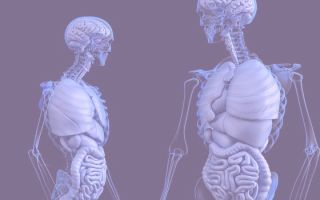Digestion is a set of processes of physical and chemical processing of food in the digestive tract, as a result of which it acquires a form that can be absorbed by the body and included in metabolism.
Content
Stages
Digestion of food begins in the mouth, where it is crushed by chewing and mixed with saliva. Here the hydrolysis of polysaccharides begins under the action of salivary enzymes, which continues in the stomach. Then the food bolus enters the stomach through the esophagus. The length of time food remains in the stomach is determined by the efficiency of digestion.
Due to the fact that the activity of saliva is low, the hydrolysis of food proteins mainly begins in the acidic environment of the stomach under the action of gastric juice.
Hydrolysis and absorption of nutrients occur in the middle (proximal) part of the small intestine; its distal (final) part, as a reserve, is connected in case of insufficiency in the proximal one.
The movement of chyme (a mixture of food contents with pancreatic secretions, intestinal juice and bile) through the intestines occurs due to peristaltic contractions of the intestinal tube. The speed of peristaltic waves varies.
The transition of chyme from the small intestine to the large intestine is determined by the difference in pressure in their cavities and the state of the ileocecal sphincter.
In the large intestine, the main amount of water and substances formed as a result of the activity of microorganisms are absorbed, and feces are formed.
How is food digestion regulated? (Neurohumoral regulation)
Russian scientist I.P. Pavlov proved that the digestion process is represented by three phases.
The first , so-called cerebral, phase is characterized by the influence on the digestive organs of the corresponding parts of the brain according to the type of conditioned and unconditioned reflexes from receptors. The brain receives information from the body and responds to it with control signals.
The second phase (gastric) includes reflex effects from stomach receptors and the action of their hormones. In response to these signals, hormones and stomach juices are produced.
The third phase (intestinal) is characterized by reflex and humoral influences from the small intestine. Next, processes begin in the small intestine.
The motility of the gastrointestinal tract is also regulated by the same principle.
Digestion in children
In the early stages of the postnatal period (when feeding on milk), intracellular and membrane digestion predominates. As the child switches to a mixed diet and then to a regular diet, the secretory activity of the digestive glands and bile secretion increase, which helps to improve cavity digestion.
At the early stages of development, hormonal and local nervous mechanisms for regulating digestive functions are formed and improved. At later stages, central reflex mechanisms are included in the regulatory system.
Aged people
With aging, involutive changes in the digestive system occur and its functional activity decreases. This is mainly due to a decrease in blood supply to organs, and simultaneously with an adaptive restructuring of digestive functions.
Synthesis, secretion and active hydrolysis are reduced, the enzyme spectrum changes, and the intensity of intestinal digestion and absorption is significantly reduced. These processes are partially compensated by a slowdown in the passage of chyme and changes in the intestinal microflora.
Reasons for violation
The main reason is inadequate nutrition:
- starvation,
- excessive consumption of refined products (sugar, juice, oils, bread made from premium flour, etc.), due to which ballast substances do not enter the body,
- nutrition that is not balanced in individual components,
- improper eating pattern (too often)
- food on the go,
- poor chewing of food.
Disorders of digestive processes in the oral cavity are associated with
- dental caries,
- periodontal disease,
- lack of teeth,
- a small amount of saliva,
- development of inflammatory processes in the oral cavity.
In the esophagus, food may be obstructed
- tumors
- diverticula,
- cicatricial narrowings,
- muscle atony.
More significant digestive disorders are observed with stomach pathologies:
- excessive or insufficient secretion of gastric acid;
- impaired secretion of gastric mucus, which neutralizes hydrochloric acid.
In the intestines, the process of digesting food is disrupted when
- motor disorder
- suction,
- villous atrophy,
- dysbacteriosis.
You can read more about digestion in the intestine in the articles “ Small Intestine ”, “ Dodeum ”, “ Large Intestine ”.
Symptoms of indigestion
The main symptom is stool disorder - diarrhea or diarrhea.
In addition, you need to pay attention to your gastrointestinal tract when
- nausea,
- vomiting
- flatulence (bloating)
- abdominal pain.
Absorption disorders affect the condition of almost all body systems.
Congenital diseases usually appear in childhood.
The most difficult in diagnostic and therapeutic terms are disorders associated with inadequate nutrition, since they manifest themselves mainly at the stage of final pathological changes in the form
- obesity,
- cholelithiasis,
- urolithiasis,
- atherosclerotic vascular lesions,
- colitis,
- fatty liver degeneration.







